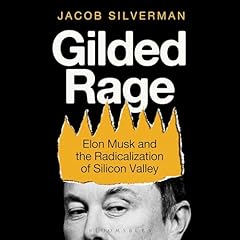
Why Nothing Works
Who Killed Progress—and How to Bring It Back
No se pudo agregar al carrito
Solo puedes tener X títulos en el carrito para realizar el pago.
Add to Cart failed.
Por favor prueba de nuevo más tarde
Error al Agregar a Lista de Deseos.
Por favor prueba de nuevo más tarde
Error al eliminar de la lista de deseos.
Por favor prueba de nuevo más tarde
Error al añadir a tu biblioteca
Por favor intenta de nuevo
Error al seguir el podcast
Intenta nuevamente
Error al dejar de seguir el podcast
Intenta nuevamente
 Exclusivo para miembros Prime: ¿Nuevo en Audible? Obtén 2 audiolibros gratis con tu prueba.
Exclusivo para miembros Prime: ¿Nuevo en Audible? Obtén 2 audiolibros gratis con tu prueba.
Elige 1 audiolibro al mes de nuestra inigualable colección.
Acceso ilimitado a nuestro catálogo de más de 150,000 audiolibros y podcasts.
Accede a ofertas y descuentos exclusivos.
Premium Plus se renueva automáticamente por $14.95 al mes después de 30 días. Cancela en cualquier momento.
Compra ahora por $28.79
-
Narrado por:
-
David de Vries
“Dunkelman summarizes the history perfectly.” —David Brooks, The New York Times
Named a Best Book of the Year by Financial Times • The Economist
America was once a country that did big things. But today, even while facing a host of pressing challenges—a housing shortage, a climate crisis, dilapidated infrastructure—we feel stuck. As Marc J. Dunkelman reveals, America is the victim of a vetocracy that allows nearly anyone to stifle progress. While conservatives deserve some blame, progressives have overlooked an unlikely culprit: their own fears of “The Establishment.”
A half century ago, reformers began to put speaking truth to power ahead of exercising that power for good. Now, the ensuing gridlock has pummeled faith in public institutions of all sorts and opened the door for MAGA-style populism. Why Nothing Works uncovers the roots of this predicament, and boldly shows how progressives can once again build a better future for all.
Los oyentes también disfrutaron:




















Reseñas de la Crítica
“Provocative reading for anyone with a stake in public works writ large.”—Kirkus
“Why America can’t build is the central economic and political question of our time. In Why Nothing Works Marc Dunkelman asks progressives to reflect on how their own ideas have stymied the nation’s ability to address the housing and climate crises and slashed national ambition in public works projects. A fantastic thinker, Dunkelman has written an essential book for anyone seeking to understand how Americans have lost faith in democratic institutions that over-promise and under-deliver.”—Jerusalem Demsas, The Atlantic
“America is living the truth of the old saying: Any old jackass can kick down a barn, but it takes a carpenter to build one. Today, it feels like anyone can stop progress, but nobody’s capable of starting it. I got into politics because when I was a kid, government delivered big things for my little corner of Louisiana—roads, and canals, and electricity. If you want to know why that happened back then, why it’s not happening now, and how we can start doing and building big things again, then this is the book for you.”—James Carville
“Anyone who has been frustrated with the inefficiency of government must read this book. Dunkelman takes us on a sweeping investigation of how, over the course of the twentieth century, the public sector has been increasingly paralyzed from exercising authority, demonstrating convincingly that the Progressive Left has been as much at fault in undermining popular trust as the Conservative Right. This beautifully written book cuts to the central dilemma of our day: how to empower a strong central government that works while still respecting the will of the people and inviting democratic participation. Dunkelman has confidence that we can do better—and he shows us how.”—Lizabeth Cohen, Howard Mumford Jones Professor of American Studies, Harvard University, and author of Saving America’s Cities
“Friends of democracy typically hold two honorable impulses in tension: Power should be widely dispersed, and citizens should control the decisions affecting their lives; and democratic government should be able to accomplish big things and undertake big projects. Dunkelman’s provocative, well-argued thesis is that errors made in the name of the first objective have prevented democracy from achieving the second. Why Nothing Works is a spirited and thoughtful intervention in the debate progressives need to have.”—E.J. Dionne Jr., author of Why Americans Hate Politics
“For progressive politics to work, the public must have an affirmative view of government and its effectiveness. This book is essential reading to appreciate how sometimes we can be our own worst enemy.”—Rahm Emanuel
Las personas que vieron esto también vieron:


















Although the book explains "why nothing works," it also shows how, at one point, everything did. Dunkelman compellingly traces how major sectors in the U.S. were built through strategic public-private partnerships, diving deep into the politics, legislation, and judicial evolutions behind them. The book could almost have been titled "What Happened After The Power Broker"—it feels like a spiritual sequel.
Dunkelman displays an impressive mastery of U.S. political history, moving fluidly from the Revolution to Teddy Roosevelt, from the Tennessee Valley Authority to the New Deal, and on through the reforms of the 1940s, public assistance policies, police reform, environmental policy, the airline industry, housing policy, the interstate highway system, and even the electrical grid. The breadth of this book left me proud of the countless entrepreneurs and public servants who skillfully balanced centralized authority with individual rights—until, as Dunkelman explains, corruption and self-interest often crept in.
Throughout, Dunkelman balances a broad historical overview with vivid anecdotes. Although occasionally dry, his storytelling makes complex historical processes digestible, compelling, and fair. Familiar figures like Robert Moses and FDR frequently appear alongside lesser-known characters, each illustrating how personal ambitions and political battles shaped America's infrastructure.
The book really gains momentum when Dunkelman explores modern examples of how interest groups and bureaucratic red tape have derailed urgently needed projects. The story of the blocked clean energy transmission line from Canada to Massachusetts is particularly infuriating, vividly demonstrating how good intentions can be strangled by narrow interests.
Though Donald Trump isn't a central figure, his presence quietly underscores the narrative. Reading in 2025, I couldn't help but consider how his approach to governance both critiques the progressive-built systems and offers a chance to rethink and reshape our cities and states. Dunkelman pushes us to recognize that proving government can work effectively might be our most crucial task.
The book left me grappling with big questions—a hallmark of any excellent read. For instance, if progressives become less cautious about power and embrace stronger authority capable of cutting through bureaucracy, how do we prevent these empowered institutions from becoming captured by the powerful at the expense of the environment and ordinary people? Are we inevitably doomed to a cycle where the little guy always shoulders the burden, regardless of who's in charge? Can we accept some degree of corruption or excess as the price of progress—and can we trust ourselves to manage it fairly?
I enthusiastically recommend Why Nothing Works. It’s an insightful, enlightening journey through America’s past and present, provoking essential reflections about how we might finally make meaningful changes for our collective future.
An important book (and enjoyable listen)
Se ha producido un error. Vuelve a intentarlo dentro de unos minutos.
Good title
Se ha producido un error. Vuelve a intentarlo dentro de unos minutos.
Only through the beginning, so still on the fence about the argument. Why was Biden so unpopular if he was doing the right thing?
Bad sound quality!
Se ha producido un error. Vuelve a intentarlo dentro de unos minutos.
Must Read
Se ha producido un error. Vuelve a intentarlo dentro de unos minutos.
I Got the Message
Se ha producido un error. Vuelve a intentarlo dentro de unos minutos.


